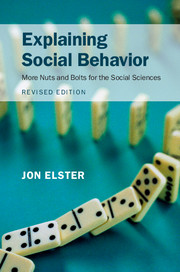III - Action
Published online by Cambridge University Press: 05 August 2015
Summary
Although I shall largely use “action,” “behavior,” “decision,” and “choice” as synonymous terms, it can be useful to distinguish among them. The broadest category is behavior, understood as any bodily movement whose origin is internal to the agent, not external (as when he is carried away by a landslide). Action is intentional behavior, caused by the desires and beliefs of the agent. Thus reflex behaviors are not actions; having an erection is not an action (but it may be induced by one, such as taking Viagra); falling asleep is not an action (but may be induced by taking a sleeping pill).
An action may or may not be preceded by a conscious decision. When Pascal said that we are “automata as well as minds” and Leibniz that “we are empirical in three-quarters of our actions,” they referred to the habitual and unthinking character of much everyday behavior. When I drive to work along my usual route I do not consciously decide to turn right here and left there. The very first time or times I drove to work, however, the actions were preceded by explicit decisions. In fact, they were preceded by an explicit choice among alternative paths. Although all choices are decisions, the converse is not true. When I decide to pick up the book I have been reading, I need not have any explicit alternative in mind. I see the book on the table; the sight reminds me that I have enjoyed reading it; and I decide to pick it up. No choice is involved.
The focus in Part III is on choice. I believe that the concept of choice is the most fundamental idea in the social sciences. In Part II, I considered the subjective precursors of choice: preferences (desires, motivations), beliefs, emotions, and prejudices, as well as some precursors of these precursors. In the following chapters, I consider the mechanisms by which these precursors generate choices and, usually, actions. I say “usually,” because not all choices lead to actions. One may choose not to do something, for example, not to save a drowning person if the intervention would be at some risk to oneself. If the person drowns and no third parties are involved, I have no causal responsibility for the outcome. I may have a moral and, in some countries, a legal responsibility, but that is another matter.
- Type
- Chapter
- Information
- Explaining Social BehaviorMore Nuts and Bolts for the Social Sciences, pp. 187 - 188Publisher: Cambridge University PressPrint publication year: 2015



